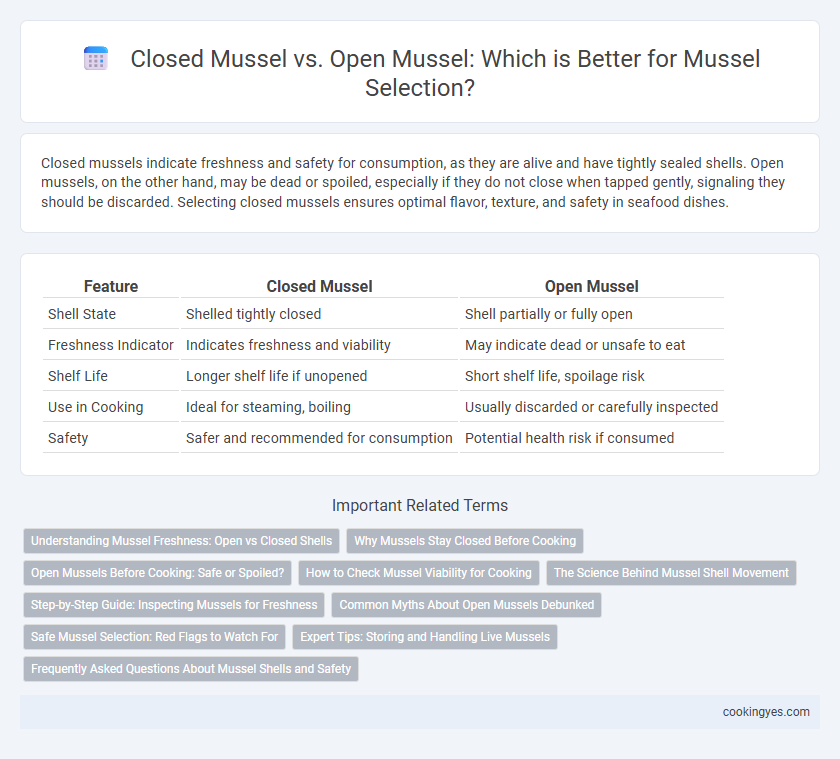Closed mussels indicate freshness and safety for consumption, as they are alive and have tightly sealed shells. Open mussels, on the other hand, may be dead or spoiled, especially if they do not close when tapped gently, signaling they should be discarded. Selecting closed mussels ensures optimal flavor, texture, and safety in seafood dishes.
Table of Comparison
| Feature | Closed Mussel | Open Mussel |
|---|---|---|
| Shell State | Shelled tightly closed | Shell partially or fully open |
| Freshness Indicator | Indicates freshness and viability | May indicate dead or unsafe to eat |
| Shelf Life | Longer shelf life if unopened | Short shelf life, spoilage risk |
| Use in Cooking | Ideal for steaming, boiling | Usually discarded or carefully inspected |
| Safety | Safer and recommended for consumption | Potential health risk if consumed |
Understanding Mussel Freshness: Open vs Closed Shells
Closed mussels indicate freshness as live mussels keep their shells tightly sealed to protect against contamination. Open mussels that do not close when tapped are often dead and should be discarded to avoid foodborne illness. Selecting mussels with firmly closed shells ensures optimal quality and safety for consumption.
Why Mussels Stay Closed Before Cooking
Mussels remain closed before cooking as a natural defense mechanism to protect their soft tissues from predators and environmental stress. The closed shells also help preserve freshness by preventing the infiltration of contaminants and maintaining moisture inside. Selecting mussels that stay tightly closed indicates freshness and viability, essential for safe consumption and optimal flavor.
Open Mussels Before Cooking: Safe or Spoiled?
Open mussels before cooking can be safe if they close when tapped, indicating they are alive and fresh; however, mussels that remain open after tapping should be discarded as they are likely spoiled and unsafe to eat. Proper handling includes checking for intact shells and a fresh, ocean-like smell, as these factors help ensure the mussels' quality. Consuming spoiled mussels can lead to food poisoning, highlighting the importance of selecting only live, responsive shellfish.
How to Check Mussel Viability for Cooking
Closed mussels indicate freshness and are generally safe for cooking, while open mussels require closer inspection to determine viability. Tap open mussels lightly; if they close promptly, they are alive and suitable for consumption, whereas mussels that remain open should be discarded. Smell is another indicator--fresh mussels have a mild, ocean-like scent, while a strong, unpleasant odor signifies spoilage.
The Science Behind Mussel Shell Movement
Mussel shell movement is controlled by adductor muscles that contract to close the shells tightly, protecting the organism from predators and environmental stressors, while relaxation of these muscles allows the shells to open for feeding and respiration. Closed mussels have actively contracted adductor muscles, indicating heightened stress or defense mode, while open mussels exhibit relaxed muscles, facilitating filter feeding and gas exchange. Understanding the biochemical and neuromuscular signals regulating shell closure and opening is critical for assessing mussel behavior and their responses to environmental changes.
Step-by-Step Guide: Inspecting Mussels for Freshness
To select fresh mussels, start by checking that their shells are closed tightly; closed shells indicate the mussel is alive and fresh. Gently tap any open mussel, and if it closes promptly, it is safe to use, while mussels that remain open should be discarded. Inspect shells for cracks or damage and avoid mussels with broken shells to ensure optimal quality and safety.
Common Myths About Open Mussels Debunked
Common myths about open mussels include the belief that they are unsafe to eat, but in reality, many open mussels close when cooked and are perfectly edible. It is a misconception that all open mussels indicate spoilage; rather, fresh mussels that remain open after tapping are likely dead and should be discarded. Properly selecting mussels involves checking for a fresh, sea-like smell and discarding those with strong odors or broken shells, ensuring safety and quality regardless of their initial open or closed state.
Safe Mussel Selection: Red Flags to Watch For
Closed mussels are generally safer for consumption as they indicate freshness, while open mussels may be dead and unsafe to eat. A key red flag is a broken or cracked shell, which suggests spoilage or contamination. Always choose mussels that are tightly closed or close when tapped to ensure safe selection.
Expert Tips: Storing and Handling Live Mussels
Closed mussels indicate freshness and vitality, making them ideal for selection, while open mussels that do not close when tapped should be discarded. Store live mussels in a breathable container covered with a damp cloth and keep them in the coldest part of the refrigerator, ideally between 1-4degC (34-39degF). Avoid sealing mussels in airtight containers or submerging them in water to prevent spoilage and maintain optimal freshness.
Frequently Asked Questions About Mussel Shells and Safety
Closed mussels indicate freshness and safety for consumption since they tightly seal their shells until cooking; open mussels that do not close when tapped are likely dead and should be discarded to avoid foodborne illness. Shell integrity is crucial, as cracked or broken shells can harbor harmful bacteria, posing health risks. Proper handling and storage at temperatures below 40degF (4degC) maintain mussel safety and prevent spoilage.
Closed Mussel vs Open Mussel for Selection Infographic

 cookingyes.com
cookingyes.com